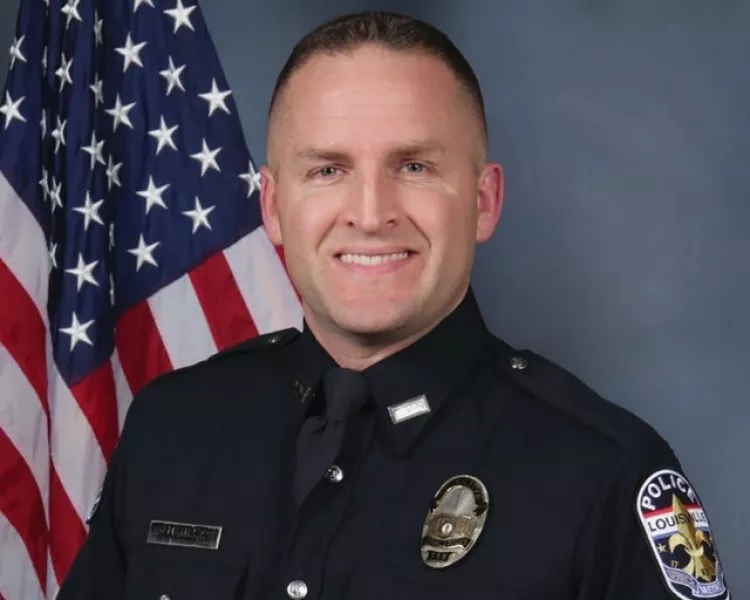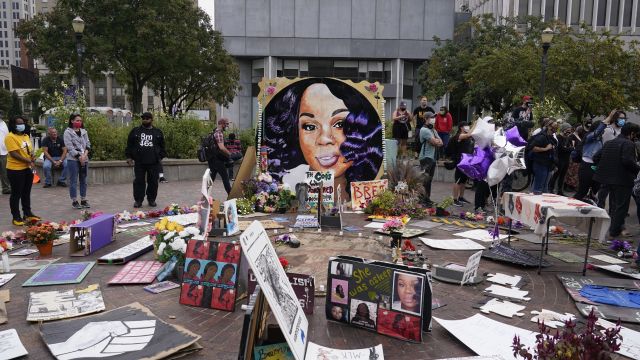Brett Hankison’s plea came five days after a grand jury indicted him on three counts of wanton endangerment for firing into the home of Ms Taylor’s neighbours in Louisville, Kentucky.
The grand jury declined to charge him or the other two undercover narcotics officers who opened fire inside Ms Taylor’s house on the night of March 13 with her shooting.
Hankison’s lawyer asked that his client be allowed to keep firearms for self-defence. He said Hankison, who was fired in June, “has received a number of threats”. The judge turned down the request.

The decision not to charge the officers set off protests in Louisville and across the country. The city’s mayor lifted a curfew on Monday that had been in place after many people refused to stop their night-time protests.
“The curfew served its purpose of helping ensure that most people were home safe by 9pm, because our past experience had shown that most violence and destruction occurs after dark,” Greg Fischer’s statement said.
“We sadly saw some violence, including the shooting of two police officers, one of whom remains hospitalised, dealing with complications from his injuries. But we believe the curfew helped, by ensuring fewer people were out late in the day.”
The curfew that has been in place since Sept. 23 has expired as of 6:30 this morning. We appreciate that most protests over the past several days have been peaceful. Thanks to @LMPD for their hard work in planning & executing this protest detail.
— Mayor Greg Fischer (@louisvillemayor) September 28, 2020
Meanwhile, Kentucky state representative Lisa Willner, a Louisville Democrat, said she is starting to craft legislation that would narrow the scope of the state’s rioting statute.
Her proposal, which she intends to offer in next year’s legislative session, would protect people from being charged with first-degree rioting if they are present but do not engage in destructive or violent actions.
Her response comes after Democratic colleague Attica Scott was charged with the felony last week while participating in Louisville protests for racial justice.
“This is not any attempt at all to weaken the current law,” Ms Willner said. “It’s just to make sure that people who are peacefully protesting, who are merely exercising their First Amendment rights, are clearly not engaging in rioting.”
Ms Scott was among demonstrators who converged in central Louisville to express their disagreement with the grand jury decision. Many marched along Louisville’s streets chanting “Breonna Taylor, say her name”, and “no justice, no peace”.

Ms Taylor was shot multiple times after her boyfriend opened fire as officers entered her home during a narcotics raid, authorities said. The boyfriend said he did not know who was coming in and fired in self-defence. One officer was wounded.
A coroner’s report obtained on Monday said Ms Taylor was shot five times and died of multiple gunshot wounds. It says she was hit in the torso, her upper left extremity and both lower extremities. She tested negative for drugs and alcohol.
Ms Scott, the state’s only black female representative, was arrested and charged on Thursday night with the felony of first-degree rioting as well as unlawful assembly and failure to disperse.
Police said she was in a group whose members damaged buildings and set fire to a library.
She called the charges “ludicrous” and said she would never be involved in setting fire to a library. She said she was arrested as she walked with her daughter to the sanctuary of a church.
Kentucky law defines a riot as a public disturbance involving five or more people “which by tumultuous and violent conduct creates grave danger of damage or injury to property or persons or substantially obstructs law enforcement or other government function”.
The law defines first-degree rioting as knowingly participating in a riot that causes injury to a person who is not rioting or causes substantial property damage.
Ms Scott said she and her daughter were driving from a protest to a church that offered refuge to people who would otherwise be caught violating the curfew when police blocked their route, so they parked and walked to the church instead. Officers then converged on them to make arrests before the curfew took effect, she said.
“LMPD swarmed us,” she said. “They started yelling, ‘Circle ‘em, circle ‘em.’ They wouldn’t let us leave to go back to our vehicle. And they wouldn’t let us literally cross the street to get to the church and sanctuary.”







